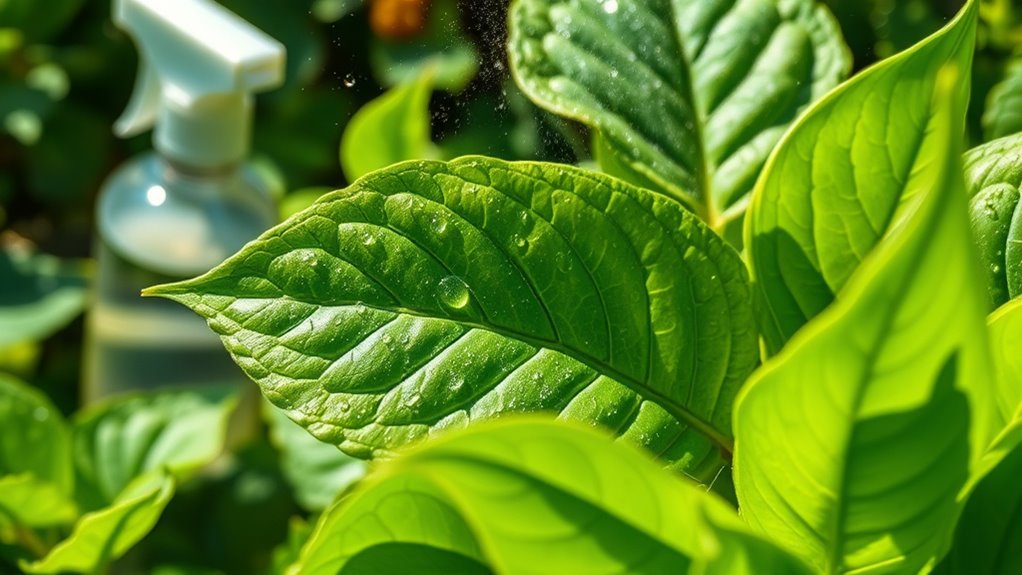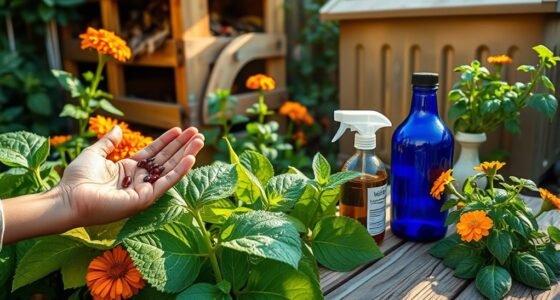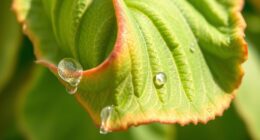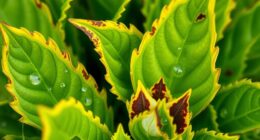To create a DIY natural insecticide, mix one tablespoon of mild liquid soap with a quart of water, adding a small amount of vegetable oil if desired for better adhesion. Spray this solution directly on affected leaves, especially the undersides, early in the morning or late in the evening. Use regularly on soft-bodied pests like aphids and whiteflies, and you’ll discover simple, eco-friendly ways to protect your garden effectively. Keep exploring to learn more tips and tricks.
Key Takeaways
- Use a mixture of 1 tablespoon mild liquid soap per quart water to create an effective, eco-friendly insecticidal spray.
- Spray directly on affected plant areas, focusing on undersides of leaves where pests hide, preferably in early morning or late evening.
- Target soft-bodied pests like aphids, whiteflies, and spider mites; reapply regularly for best results.
- Test the spray on a small plant section beforehand to prevent leaf dehydration or damage.
- Incorporate soap spray into an integrated pest management plan for sustainable, chemical-free pest control.

If you’re looking for an eco-friendly way to keep pests at bay, making your own natural insecticide is a simple and effective solution. Soap sprays are one of the most accessible pest control methods you can use in your garden, especially if you’re committed to organic gardening techniques. They work by coating pests with a thin layer of soap, disrupting their cell membranes and causing them to dehydrate or suffocate. Plus, they are safe for your plants, beneficial insects, and the environment when used correctly.
To create your own soap spray, you’ll need a few basic ingredients: a mild liquid soap—preferably biodegradable and free from added fragrances or harsh chemicals—and water. Some gardeners also add a small amount of vegetable oil to help the solution stick better to pests. The ratio is simple: mix one tablespoon of soap with a quart of water. Before applying the spray broadly, always test it on a small section of your plants to ensure they won’t be affected adversely. Once you’re confident it won’t harm your plants, you can spray it directly onto affected leaves and stems, paying extra attention to the undersides where pests often hide.
Create a simple soap spray with biodegradable soap, water, and a touch of vegetable oil for pest control.
Using soap sprays aligns well with organic gardening techniques because it’s a natural remedy that doesn’t introduce harmful chemicals into your soil or water systems. It’s also a quick, cost-effective solution that fits seamlessly into your pest control methods. Regular applications, especially when pests are first noticed, can keep populations under control without resorting to synthetic pesticides. Remember, however, that soap sprays are most effective on soft-bodied insects like aphids, whiteflies, and spider mites. Larger or more resilient pests might require different approaches or repeated treatments.
Applying soap sprays consistently and at the right times—preferably in the early morning or late evening—maximizes their effectiveness while minimizing potential leaf damage. Since soap can sometimes cause minor leaf dehydration if used excessively, always follow the recommended dilution and avoid over-application. Keep an eye on your plants after spraying, and if you notice any adverse effects, rinse the leaves with water. Over time, incorporating soap sprays into your pest control methods can help you maintain a healthy, thriving garden using natural, sustainable practices.
Frequently Asked Questions
How Often Should I Apply Soap Sprays for Best Results?
You should apply soap sprays every 7 to 10 days to maintain control and prevent pest rebound. Regular application guarantees pests don’t develop resistance and minimizes damage to your plants. Keep an eye on your garden’s condition; if you notice new pest activity, increase the frequency temporarily. Consistent application is key to keeping pests at bay without harming beneficial insects or your plants.
Are Soap Sprays Safe for All Types of Plants?
You might wonder if soap sprays are safe for all plants. It depends on plant sensitivity and soap concentration; some plants react badly to certain formulations. Always test a small area first and use a mild soap concentration to minimize harm. If your plants are delicate or sensitive, opt for gentler solutions or avoid soap sprays altogether. Monitoring their response helps make sure your garden stays healthy and pest-free.
Can Soap Sprays Eliminate All Garden Pests?
You might think soap sprays can eliminate all pests, but that’s a coincidence. While they’re effective against many soft-bodied insects, their success depends on plant tolerance and pest resistance. Some pests develop resistance over time, and certain plants may not tolerate soap sprays well. For best results, use soap sprays as part of an integrated pest management plan, understanding that they won’t completely eradicate every pest in your garden.
What Ingredients Are Best for Making Effective DIY Soap Sprays?
You ask about the best ingredients for effective DIY soap sprays. To create a potent spray, use natural ingredients like pure liquid soap, such as castile soap, mixed with water. Incorporate insect-repelling plants like neem oil or garlic for added protection. These ingredients work together to target pests while being safe for your garden’s beneficial insects. Always test your spray on a small area before widespread application.
How Do I Store Leftover Soap Spray Solution Safely?
To store leftover soap spray solution safely, you need proper storage containers that keep the solution stable. You should choose airtight, opaque bottles to prevent light and air exposure, which can reduce solution stability. Store the containers in a cool, dry place away from children and pets. Always label your containers clearly, and shake well before reuse to guarantee effectiveness. Proper storage keeps your DIY insecticide safe and ready for next use.
Conclusion
Now that you know how to make your own soap spray, you can confidently protect your garden naturally. For example, imagine saving your tomatoes from pesky aphids using just a simple homemade solution. With a little effort, you’ll enjoy a healthier, pest-free garden without harsh chemicals. So go ahead—grab your ingredients, give it a try, and watch your plants thrive naturally! Your garden will thank you for it.









